Faced with PSLE anxiety, boy finds help - and joy - from therapy dogs
Animal-assisted therapy is relatively new in Singapore, but some are turning to it to help them improve their emotional well-being. On The Red Dot finds out how well it can work.
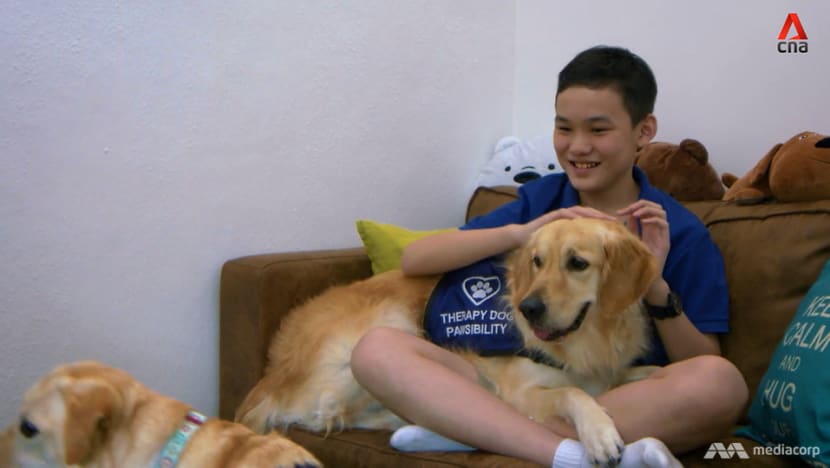
Ralph Teo, 12, has been having therapy with the help of dogs such as Hope and Telly.
SINGAPORE: When Ralph Teo was having problems preparing for the Primary School Leaving Examination (PSLE) this year, he received help from an unconventional source: Therapy dogs.
Playing with dogs and petting them, his mother Carol Hua figured, may help him to tackle his anxiety problems.
In the weeks leading up to the PSLE, a golden retriever, a labrador retriever and a miniature schnauzer from counselling centre Pawsibility helped the 12-year-old regain some of his self-esteem and improve his state of mind.
“When I went to my therapy sessions, Telly, Hope and Riley would wag their tails very hard,” he said. “They recognised me and appreciated me as a person.”
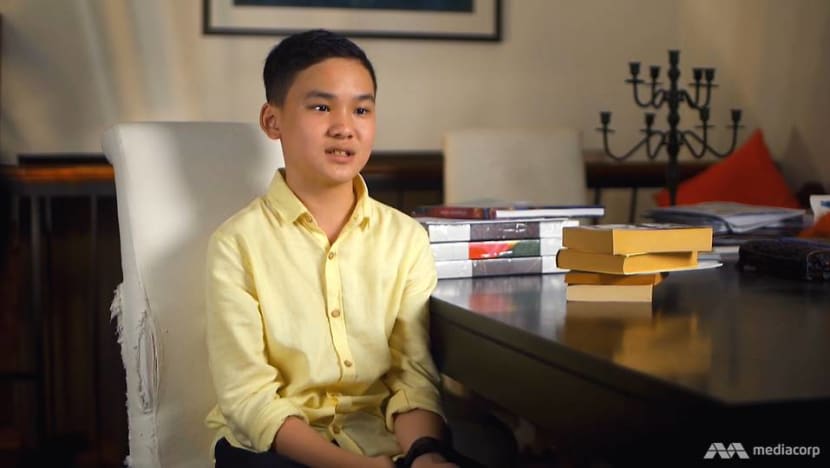
Empathy, acceptance and listening skills are traits of a good therapist, and these “healthcare assistants” or therapy dogs are well equipped for the job — something that he and the programme On The Red Dot have discovered. (Watch this episode here.)
GOOD FOR BLOOD PRESSURE
Ralph has dyslexia, which means difficulties in reading, writing and spelling. He also suffers from apraxia of speech, a disorder that makes it hard to speak clearly. And because of his learning needs, he must work doubly hard at school.
“I think the teachers or adults might judge me because my reading skills aren’t great,” he said. “Sometimes their facial expressions made me shiver.”
He also complained about not sleeping well, and his results dipped last year.
“Ralph does share with me his experiences in school with his friends and teachers. He says, ‘Mum, some of my friends like to use the ‘S’ word on me …. slow and, you know, stupid,” said Hua.

To address his emotional needs, she approached Pawsibility, which specialises in animal-assisted therapy. Before she looked for help, she had not heard of therapy with dogs, so she “wasn’t too sure whether they’d attack (her) child out of the blue”.
Ralph’s first encounter with the dogs was “a little bit uncomfortable”, he recounted, because they kept licking him.
Animal-assisted therapy is not, however, about simply playing with the animals, said Pawsibility founder Maureen Huang.
It’s like going for any kind of counselling … whereby we’re focused on helping the person to gain perspective, to work through life challenges.
She added that “dogs bring something very special into the therapy setting, different from other animals”.
“Studies have shown that interacting with a friendly dog for 15 minutes helps to lower our blood pressure, heart rate (and the) stress hormone, cortisol, and increases … oxytocin (a hormone linked to social interaction),” she cited.
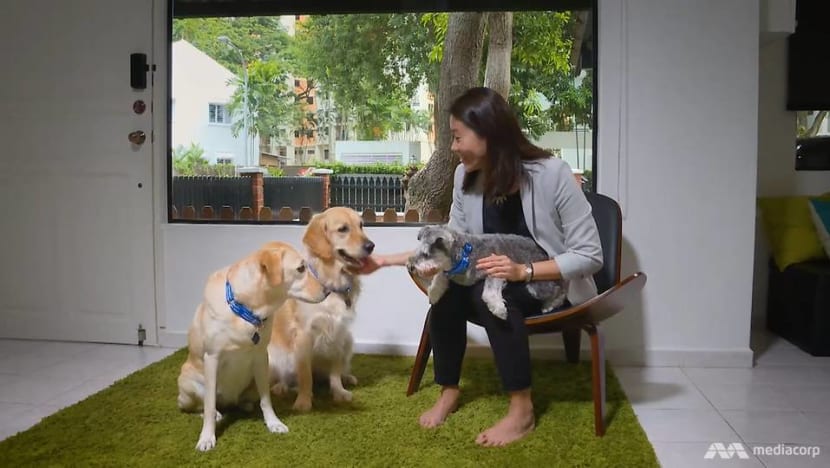
OFFERING SILENT SUPPORT
For Ralph, she decided to help him build up confidence to face the challenge of the PSLE and overcome some of his negative thoughts.
She tries to match her dogs with the right client, and the three that helped the boy have “completely different personalities”. For example, Hope, the golden retriever, can “(pick) up on how people are feeling”, she cited.
“Whenever someone is sharing something that’s particularly hard or sad, she’d reach her paw out … to offer that silent support.”
It was during one of the sessions while Ralph was petting Hope on his lap when he seemed at ease sharing with Huang the reason he was anxious about the PSLE.
WATCH: Therapy dogs help 12-year-old with dyslexia pass PSLE (4:07)
It was not only the PSLE. Sometimes he was stressed out over homework and would lose his temper, needing his mother to calm him down.
Some of his schoolmates get to him, he shared. “They always tell me that I’m not smart (and) I won’t be in a good school. And this affects my performance.”
As part of the therapeutic process, he also did a mini-obstacle course with the dogs. The purpose was to relate some of the dogs’ difficulties manoeuvring around the obstacle course to his personal life and struggles with school.
Huang, who noted that dogs can read human emotions in a way few animals do, said having a friendly therapy dog during the sessions helps clients to have the mindset that they are seeing a good friend, instead of a counsellor they see for their problems.
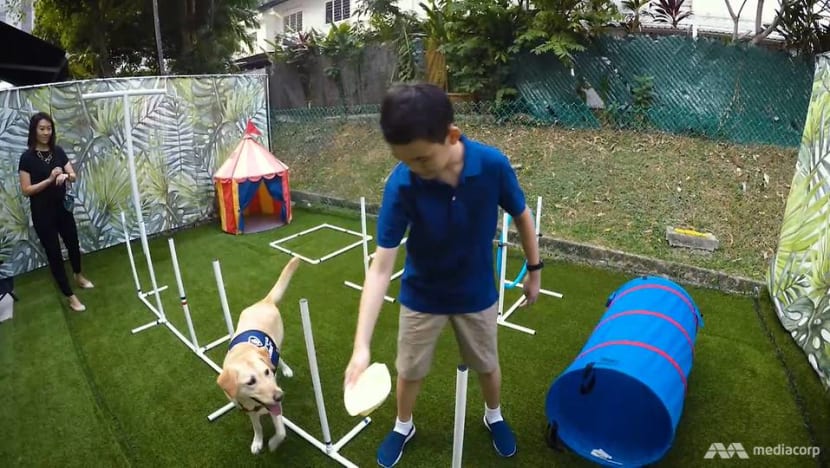
NO EASY START
She was training in the United States and the United Kingdom when she saw how beneficial animal-assisted therapy was to engaging and motivating clients.
“In Asia, we’re often lagging behind our Western counterparts when it comes to the therapy setting,” said the certified animal-assisted therapist.
She recalled a session where a group of teenagers did not react to her when she walked into the room.
“But when my dogs walked into the room, suddenly all these teenagers were on the floor, patting my dogs and asking me questions. And that was my in (with them),” she said.
“That’s how … dogs (can) bring about a great difference in the rapport that we can build with our clients.”
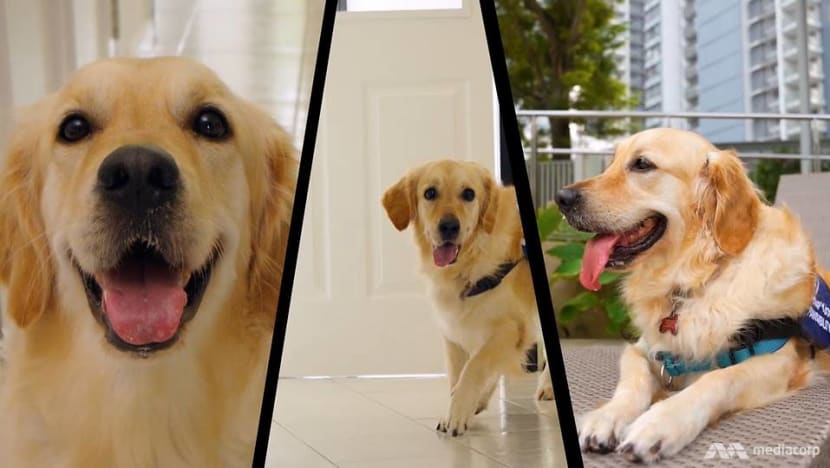
Over the past six years, she and her dogs have worked with about 800 people in Singapore with emotional and mental health issues, including adults and children as young as six.
But convincing people of the efficacy of animal-assisted therapy has not been an easy task. “We had only a handful of clients in our first year. And it was … demoralising when we faced a lot of rejection,” she said.
Business picked up after she spoke to many counsellors and educators about the benefits of animal-assisted therapy.
“In the past two years, we've upped our efforts to educate the general public, which I think is why there's a greater awareness of it, especially (in) schools and corporates,” she added.
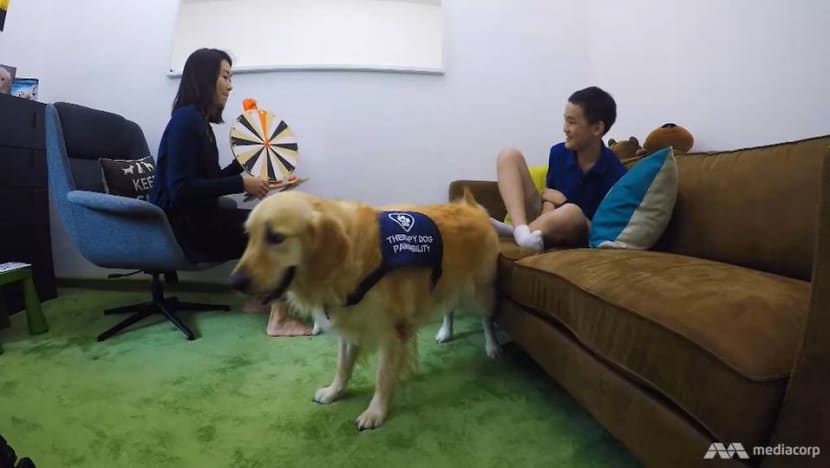
PSLE PAYOFF
In Ralph’s case, he started his weekly therapy in August. And when he took the PSLE, he recalled these sessions with the dogs whenever he stumbled over a question.
“I mostly thought about the challenges I made for them, something like (tricks) that Riley couldn’t do … (but then he did) in front of me,” he said. “If Riley can do it, like a very hard challenge, so can I.”
Thanks to the therapy, he did not feel nervous during the examinations.
“When he’s calm, he’s more focused. He’s positive, and he stays confident,” said his mother. “Most importantly, he sleeps better. Throughout this whole period … I don’t see him waking up in the middle of the night.”
Huang pointed out that Ralph gained “a lot” from each session because of his “positive mindset”.
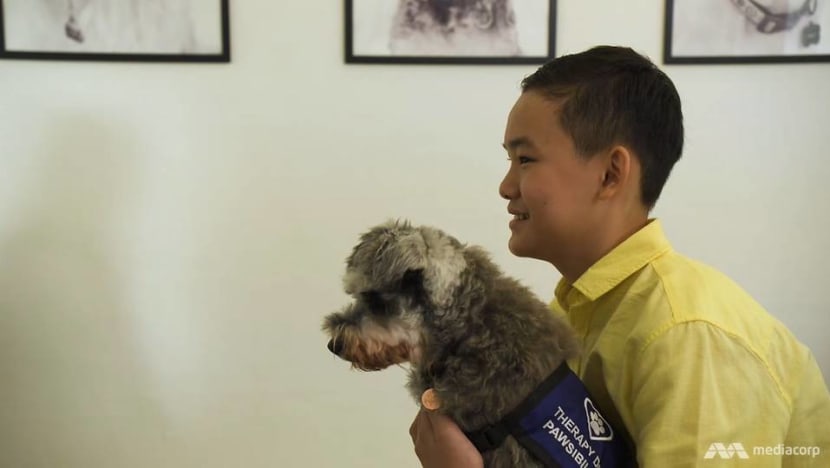
He also did well in his PSLE, which included a pass in English. He is “happy” with his results — and with his therapy dogs.
“Sometimes in my class, there’d be a very hard question (that) even my techniques don’t work,” he said. “Once I think about Riley, Telly and Hope, then I start to concentrate again.”
Watch the episode here. On The Red Dot airs on Mediacorp Channel 5 every Friday at 9.30pm.















